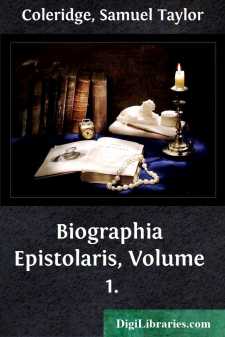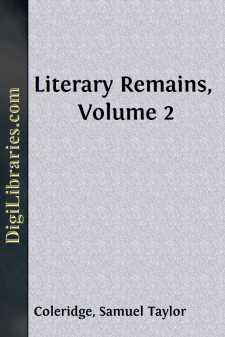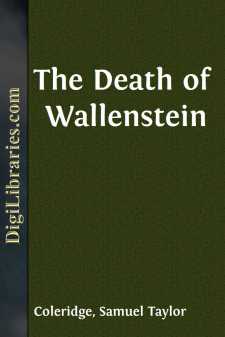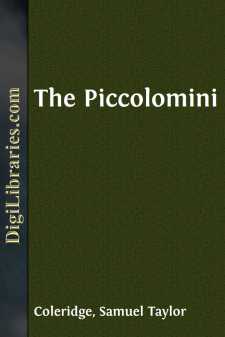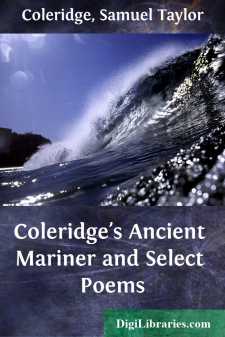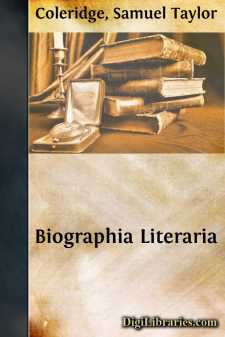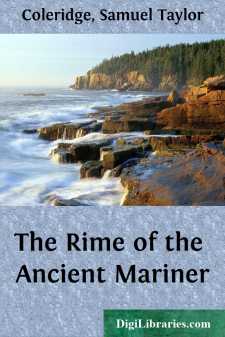Categories
- Antiques & Collectibles 13
- Architecture 36
- Art 48
- Bibles 22
- Biography & Autobiography 813
- Body, Mind & Spirit 142
- Business & Economics 28
- Children's Books 17
- Children's Fiction 14
- Computers 4
- Cooking 94
- Crafts & Hobbies 4
- Drama 346
- Education 46
- Family & Relationships 57
- Fiction 11829
- Games 19
- Gardening 17
- Health & Fitness 34
- History 1377
- House & Home 1
- Humor 147
- Juvenile Fiction 1873
- Juvenile Nonfiction 202
- Language Arts & Disciplines 88
- Law 16
- Literary Collections 686
- Literary Criticism 179
- Mathematics 13
- Medical 41
- Music 40
- Nature 179
- Non-Classifiable 1768
- Performing Arts 7
- Periodicals 1453
- Philosophy 64
- Photography 2
- Poetry 896
- Political Science 203
- Psychology 42
- Reference 154
- Religion 513
- Science 126
- Self-Help 84
- Social Science 81
- Sports & Recreation 34
- Study Aids 3
- Technology & Engineering 59
- Transportation 23
- Travel 463
- True Crime 29
Samuel Taylor Coleridge
Samuel Taylor Coleridge (1772-1834) was an English poet, literary critic, philosopher, and co-founder of the Romantic Movement in England alongside William Wordsworth. He is best known for his major works, "The Rime of the Ancient Mariner" and "Kubla Khan," which exemplify his mastery of lyrical and imaginative poetry. Coleridge's critical works, such as "Biographia Literaria," significantly influenced literary theory, emphasizing the importance of the imagination and the interplay between nature and the human mind.
Author's Books:
Sort by:
The work known as the Biographical Supplement of the Biographia Literaria of S. T. Coleridge, and published with the latter in 1847, was begun by Henry Nelson Coleridge, and finished after his death by his widow, Sara Coleridge. The first part, concluding with a letter dated 5th November 1796, is the more valuable portion of the Biographical Supplement. What follows, written by Sara Coleridge, is more...
more...
LITERARY REMAINS Extract from a Letter written by Mr. Coleridge, in February, 1818, to a gentleman who attended the course of Lectures given in the spring of that year. See the 'Canterbury Magazine', September, 1834. Ed. My next Friday's lecture will, if I do not grossly flatter-blind myself, be interesting, and the points of view not only original, but new to the audience. I make this...
more...
SCENE I. A room fitted up for astrological labors, and provided withcelestial charts, with globes, telescopes, quadrants, and othermathematical instruments. Seven colossal figures, representing theplanets, each with a transparent star of different color on itshead, stand in a semicircle in the background, so that Mars andSaturn are nearest the eye. The remainder of the scene and itsdisposition is given...
more...
PREFACE. The two dramas,—PICCOLOMINI, or the first part of WALLENSTEIN, and the DEATH OF WALLENSTEIN, are introduced in the original manuscript by a prelude in one act, entitled WALLENSTEIN'S CAMP. This is written in rhyme, and in nine-syllable verse, in the same lilting metre (if that expression may be permitted), with the second Eclogue of Spenser's Shepherd's Calendar. This prelude...
more...
I. THE BEGINNINGS Coleridge lived in what may safely be called the most momentous period of modern history. In the year following his birth Warren Hastings was appointed first governor-general of India, where he maintained English empire during years of war with rival nations, and where he committed those acts of cruelty and tyranny which called forth the greatest eloquence of the greatest of English...
more...
CHAPTER I Motives to the present work—Reception of the Author's first publication—Discipline of his taste at school—Effect of contemporary writers on youthful minds—Bowles's Sonnets—Comparison between the poets before and since Pope. It has been my lot to have had my name introduced both in conversation, and in print, more frequently than I find it easy to explain, whether I...
more...
PART THE FIRST. It is an ancient Mariner,And he stoppeth one of three."By thy long grey beard and glittering eye,Now wherefore stopp'st thou me? "The Bridegroom's doors are opened wide,And I am next of kin;The guests are met, the feast is set:May'st hear the merry din." He holds him with his skinny hand,"There was a ship," quoth he."Hold off! unhand me, grey-beard...
more...


